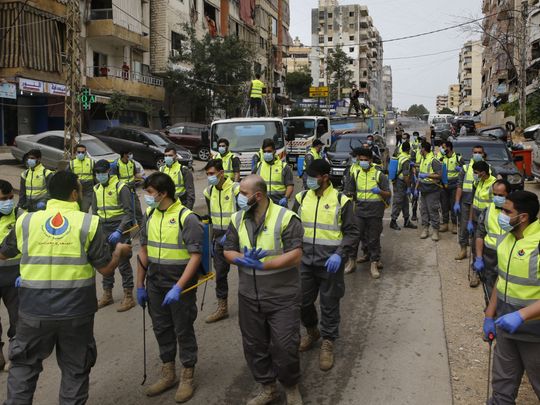
Damascus: The COVID-19 breakout in Lebanon is an economic disaster for the cash-strapped country, which has been in lockdown since mid-March, but it is starting to look like a blessing-in-disguise for Hezbollah, which presently controls the country’s Ministry of Health.
So far, 663 COVID-19 cases have been reported in Lebanon, with a death toll of 21.
Media reports say that many of the victims are Hezbollah personnel, something which Hezbollah denies. Many believe that they caught the virus from their Iranian allies, either during training sessions in Iran or on the battlefield in neighbouring Syria.
Their base in Syria, the Sayida Zeinab neighbourhood on the outskirts of Damascus, was recently sealed off completely by Syrian authorities.
The Iran-backed party has put its full weight behind its protégé, Health Minister Hamad Hassan, who assumed his job in the cabinet of Prime Minister Hassan Diab earlier this year. It hopes that if he succeeds in controlling the pandemic, the portfolio of health will become a permanent right for Hezbollah in any future cabinet formation.

Hezbollah took over the portfolio of health in January 2019, appointing an independent Jamil Jabak as minister, in order to avoid US sanctions on the Lebanese health sector. This year it promoted Hamad Hassan to the job, who technically is not a member of Hezbollah but a long-time professor of health studies at the Lebanese University.
Other portfolios previously held by Hezbollah include sports and youth affairs, and parliamentary affairs.
“Hezbollah did not choose the portfolio of health by accident,” says Fadi Akoum, a Beirut-based political analyst. “It realises that this ministry is vital for its expansionism at home and for its regional and international relations.” Speaking to Gulf News, he added: “With or without COVID-19, it will insist on the Ministry of Health in any future cabinet formation.”
Hezbollah’s medical arsenal
The party has mobilised 1,500 of its doctors and 3,000 of its nurses to work alongside the new Minister, in addition to 20,000 health workers whose salaries are being paid by Hezbollah, rather than the cash-strapped Lebanese government. The party has also allocated 32 of its medical centres in south Lebanon to cater to coronavirus patients, although the official treatment remains exclusively at the state-run Rafik Al Hariri Hospital.
This month, Hezbollah placed a compound in southern Lebanon, formerly used by veteran Shiite leader Mohammad Mehdi Shams Al Din, at the disposal of the Ministry of Health, making it a quarantine centre for COVID-19 patients.
Active in helping
Daily meals are sent to patients-in-quarantine by the Health Ministry, courtesy of Hezbollah’s ally, the Amal Movement. Meanwhile, Hezbollah personnel have been active in helping sterilise their strongholds in south Beirut, relieving the Health Ministry from that burden.
Additionally, Health Minister Hassan also paid a courtesy visit to the Christian village of Bsharri, hometown to Hezbollah’s prime opponent Samir Geagea, a former Christian warlord, to inspect the health sector there, wanting to show that the ministry was catering to all Lebanese and not just Shiite Muslims.
“Pro-Hezbollah media has been magnifying the work of the Lebanese Health Ministry,” added Akoum. “First, this helps project their strength in non-military affairs, but also, brings international attention to their work, given that health ministries across the world are now on everybody’s radar, seen as a frontline in the fight against COVID-19.”








